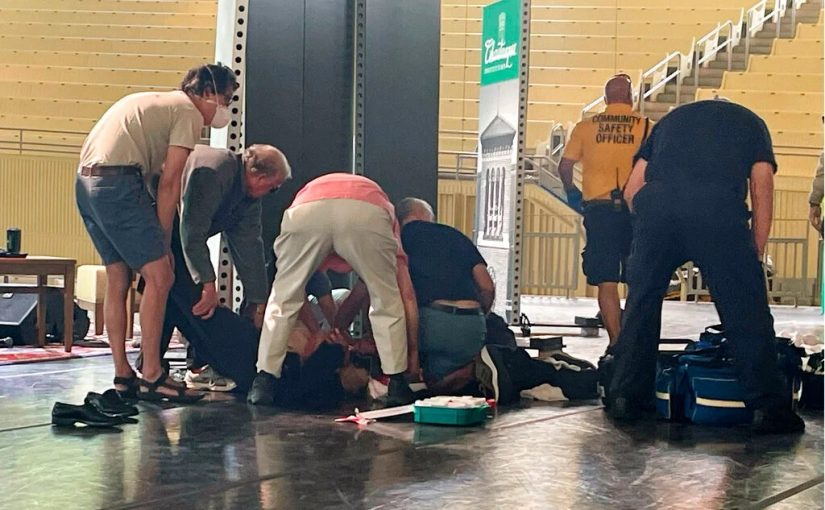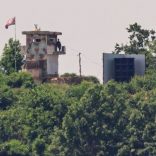Putin tells Ukraine: End war via talks or I will end it by force
Author Salman Rushdie stabbed on stage at event in New York after decades of death threats

Author Salman Rushdie is tended to after he was attacked during a lecture, Friday, Aug. 12, 2022, at the Chautauqua Institution in Chautauqua, N.Y., about 75 miles (120 km) south of Buffalo. [Photo: AP/Joshua Goodman]
Salman Rushdie, the author whose writing led to death threats from Iran in the 1980s, was stabbed in the neck, police said, as he was about to give a lecture Friday in western New York.
Video footage posted on social media showed people rushing to his aid after he was attacked at the event in Chautauqua County.
“A most horrible event just happened at #chautauquainstitution – Salman Rushdie was attacked on stage at #chq2022. The amphitheater is evacuated,” one witness said on social media.
The New York State Police said in a statement that “a male suspect ran onto the stage and attacked Rushdie and an interviewer. Rushdie suffered an apparent stab wound to the neck, and was transported by helicopter to an area hospital. His condition is not yet known.”
The interviewer also suffered a minor head injury.
New York Governor Kathy Hochul said in a press conference that Rushdie was alive and “getting the care he needs”.
A spokesperson for Rushdie, Andrew Wylie, said in an emailed statement that “Salman is in surgery,” but did not have further details to share.
The suspect was immediately taken into custody by a State trooper assigned to the event, police said. Authorities, however, did not give a motive for the attack and it was not clear what kind of weapon was used.
Rushdie, now 75, was propelled into the spotlight with his second novel “Midnight’s Children” in 1981, which won international praise and Britain’s prestigious Booker Prize for its portrayal of post-independence India.
But his 1988 book “The Satanic Verses” brought attention beyond his imagination when it sparked a fatwa, or religious decree, calling for his death by Iranian revolutionary leader Ayatollah Ruhollah Khomeini.
The novel was considered by some Muslims as disrespectful of the Prophet Mohammed.
Rushdie, who was born in India to non-practising Muslims and himself is an atheist, was forced to go underground as a bounty was put on his head — which remains today.
A decade in hiding
He was granted police protection by the government in Britain, where he was at school and where he made his home, following the murder or attempted murder of his translators and publishers.
He spent nearly a decade in hiding, moving houses repeatedly and being unable to tell his children where he lived.
Rushdie only began to emerge from his life on the run in the late 1990s after Iran in 1998 said it would not support his assassination.
Now living in New York, he is an advocate of freedom of speech, notably launching a strong defence of French satirical magazine Charlie Hebdo after its staff were gunned down by Islamists in Paris in 2015.The magazine had published drawings of Mohammed that drew furious reactions from Muslims worldwide.
Threats and boycotts continue against literary events that Rushdie attends, and his knighthood in 2007 sparked protests in Iran and Pakistan, where a government minister said the honour justified suicide bombings.
The fatwa failed to stifle Rushdie’s writing, however, and inspired his memoir “Joseph Anton”, named after his alias while in hiding and written in the third person.
“Midnight’s Children”, which runs to more than 600 pages, has been adapted for the stage and silver screen, and his books have been translated into more than 40 languages.












Leave a Reply
Be the First to Comment!
You must be logged in to post a comment.
You must be logged in to post a comment.